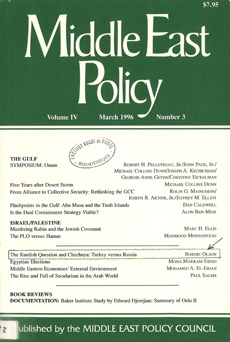|
THE KURDISH QUESTION AND CHECHNYA:
Turkish and Russian Foreign Policies Since the Gulf War
Robert Olson
This article argues that the Kurdish problem in Turkey and Russia’s war against Chechnya are linked more closely than is generally realized and acknowledged. I do not intend to discuss the entire gamut of Turkish-Russian relations which are multilayered and complex, but rather to investigate to what extent their relations are influenced by the Kurdish nationalist movement in Turkey and by that movement’s relationship to the Kurdish nationalist movements in Iraq, Iran and Syria. I suggest also that Turkey’s preoccupation with its war against the PKK (Partia Kakaren Kurdistan), the Kurdish nationalist guerrilla organization in Turkey, has greatly weakened Turkey’s foreign-policy leverage with Russia, especially regarding its war against
Chechnya. Russia in turn has used the “Kurdish” card to reduce effectively Turkey’s ability to influence its policy toward Chechnya. This became especially clear in 1995.
Turkish-Russian relations grew considerably in the late 1980s, and by the time of the Gulf War the countries were engaged in growing economic and trading relations. Between 1980 and 1990 Turkey’s economy averaged about 5.4 percent growth with most of that increase coming in the industrial sector, especially after the economic liberalization policies instituted by Turgut Ozal when he became prime minister in 1983. But after 1986 Turkey’s economy slowed, the foreign trade deficit grew dramatically, and political parties and figures began to criticize Ozal’s policies. It was the widening foreign-trade gap and the possibility that it would continue into the 1990s that seemed to be the principal reasons for Turkey to “look north.”1
Looking north meant not only to Russia, but to the other republics of the Soviet Union, especially Ukraine, as well as the Central Asian republics. After becoming prime minister in 1983, Turgut Ozal visited several capitals of the soon-to-be Commonwealth of Independent States (CIS) and signed various economic, political and cultural agreements. By the time Ozal visited Moscow in March, where he signed The Treaty of Friendship and Good-Neighborliness, Russian-Turkish trade had increased from $411 million in 1985 to $2 billion.2 The two countries planned to raise their trade volume to $9-10 billion by the year 2000. One of the most important areas of trade was the purchase of natural gas from Russia by Turkey. Another area of cooperation was construction. Turkish construction companies’ presence in Russia and in other Soviet republics grew dramatically in the 1980s and 1990s. Turkish construction firms reconstructed the Moscow White House after it was burned in 1993, built homes for Russian soldiers returning from East Germany, constructed a five-star hotel in Sochi on the Crimean coast and also built a number of hospitals and factories. Turkish construction firms are also active in the
Central Asian republics of Kazakhstan, Uzbekistan and Turkmenistan.
As of summer 1995, Russian and Turkish economic cooperation continued to grow. On July 28, 1995, the two countries signed in Moscow an agreement in which Turkey’s purchase of natural gas was to rise to 10.5 billion cubic meters from the current 6 billion. The two countries agreed that the natural-gas agreement would continue for 20 years. Oleg Soskovets, first deputy prime minister, emphasized that Russia was very interested in having greater participation by Turkish construction firms. Turkish State Minster Onur Kumbaracibasi promised that Turkey would also spend part of a $350 million investment credit in Russia starting in 1995. In turn Turkey promised to begin to pay debts it still owed Russia for building an iron-steel plant in Iskenderun. Turkey promised to transfer $10 million immediately to an open account in Moscow. The remainder of the debt was to be paid by Turkey’s selling wheat and flour to Russia. Russia was also concerned that it be allowed to participate in constructing two bridges for the new ring road around Ankara, the hydroelectric plan in Tunceli and in the electrification of railroads in the Izmir region.3
The major factor in Russian-Turkish relations is Turkey’s need for a sustained and secure energy supply. This need has increased since Ankara closed the two oil pipelines that came from Iraq, crossed southern Turkey and terminated at the Mediterranean port of Dortyol near Iskanderun as a result of Turkey’s cooperation with the American-led allied effort in the war against Iraq in 1991. This is, of course, only one of the “pipeline wars” that is raging currently in the region.4 In order to meet its energy and national-security requirements, Turkey needs to have the planned oil pipeline form the Caspian oil fields near Baku terminate in Turkey. Turkey could also serve as a distribution point for moving the gas and/or oil to Europe.
…..
1. ‘Turkkaya Ataov, “Turkey’s Expanding Relar tions with the CIS and Eastern Europe,” in Turkish Foreign Policy: New Prospects, ed. Clement H. Dodd (Cambridgeshire: The Eothen Press, 1992), pp. 88-117.
2. Ibid., p. 92.
3. Hürriyet, July 29, 1995.
4. For a good and recent account of the battles over oil and natural gas pipelines and their various distribution routes and their significance see Robert Barylski, “Russia, the West and the Caspian Energy Hub,” The Middle East Journal, vol. 49, no. 2, Spring 1995, pp. 217-232.
| 